Back to Journals » Risk Management and Healthcare Policy » Volume 13
Behavioural Problems Amongst Pre-School Children in Chongqing, China: Current Situation and Influencing Factors
Authors Yu Y, Wang T , Liang J, Yang C, Wang H, Zhao X , Zhang J, Liu W
Received 3 June 2020
Accepted for publication 28 July 2020
Published 13 August 2020 Volume 2020:13 Pages 1149—1160
DOI https://doi.org/10.2147/RMHP.S263155
Checked for plagiarism Yes
Review by Single anonymous peer review
Peer reviewer comments 2
Editor who approved publication: Professor Marco Carotenuto
Yao Yu,1,2,* Ting Wang,3,* Jiyu Liang,3 Chenlu Yang,3 Haozhuo Wang,3 Xin Zhao,4 Jiajun Zhang,1 Weiwei Liu3
1Faculty of Education, Southwest University, Chongqing 400715, People’s Republic of China; 2Collaborative Innovation Platform of 0-6-Year-Old Children’s Development and Education Network, Chongqing University of Education, Chongqing 400067, People’s Republic of China; 3School of Public Health and Management, Chongqing Medical University, Chongqing 400016, People’s Republic of China; 4Chongqing Collaborative Innovation Center for Functional Food, Chongqing Engineering Research Center of Functional Food, Chongqing Engineering Laboratory for Research and Development of Functional Food, Chongqing University of Education, Chongqing 400067, People’s Republic of China
*These authors contributed equally to this work
Correspondence: Jiajun Zhang; Weiwei Liu Tel +86-23-6848-5008
Email [email protected]; [email protected]
Introduction: Behavioural problems in pre-school children are closely related to their mental health. Such problems include attention deficit, personality disorder, overdependency, poor adaptability and conduct problems.
Methods: From December 2018 to January 2019, we conducted a cross-sectional survey of parents of pre-schoolers. The survey covered sixteen kindergartens in six districts of Chongqing, China. A total of 2200 participants participated in the survey, and 1895 questionnaires were returned. After screening, 1496 valid questionnaires were compiled in the data analysis (n=1496).
Results: Analysis of the maximum likelihood estimation revealed that age, preterm birth, household income, amount of daily interaction with parents, and scolding frequency affected behavioural problems in the pre-schoolers. Behavioural problems tend to be attenuated as children grow. Preterm children had a higher probability of developing behavioural problems than did non-preterm children. Children from families with monthly household incomes between $1130–$1695 USD and $1696–$2260 USD were more prone to developing behavioural problems. Children whose parents spent less time interacting with them (39.26% of parents interacted with children less than 1 hour per day) and children who were scolded more often had greater behavioural problems (13.44% of parents often scolded their children).
Discussion: This study was conducted to evaluate the influence of parenting methods on pre-school children and the education provided by parents on their pre-school children’s behavioural problems to provide insights for Chinese parents and mental health professionals to improve treatment of behavioural problems.
Keywords: behavioural problems, pre-school children, parental education, China
Introduction
With the development of society and progress in medical research, children’s mental health has increasingly become a concern.1 Mental health during the pre-school period profoundly affects the development of personality, self-recognition, emotions and social behaviours. Behavioural problems are amongst the most common mental health problems in pre-schoolers.2 Behavioural problems affect both the daily lives and future mental health of pre-school children3 and can degenerate into issues on a societal scale.
Behavioural problems in pre-school children mainly manifest as attention deficit,4 personality disorder,5 overdependency,6 poor adaptability,7 and conduct problems.8 The minds of pre-school children are extremely mouldable. If diagnosed at an early stage, behavioural problems can be treated effectively through scientific approaches.9 However, if not diagnosed early enough, the intervention measures will be less effective, which could hinder social adaptation,10 interpersonal communication,10,11 and academic performance11 and will exert more pressure on the children’s family and society.
Evidence shows strong connections between children’s social environment and their mental health.11,12 Most pre-school children’s activities take place with their parents. Therefore, family plays an irreplaceable role in children’s behavioural development.13 Previous studies conducted globally13,14 revealed that the education provided by parents is a critical factor in behavioural formation in pre-school children.15,16
In China, few studies have explored the impacts of parental behaviours on pre-school children’s behavioural formation. This study assessed the current status of pre-school children with behavioural problems and how education provided by parents affects these children. We aimed to provide a theoretical basis for scientifically training parents and to promote further psychological research amongst pre-school children by exploring the relationship between the attitudes of parents toward education and the behavioural problems of their children.
Methods
Method and Participants
This cross-sectional survey was conducted in Chongqing, China, from December 15, 2018, to January 15, 2018, in the districts of Jiangbei, Shapingba, Nanan, Banan, and Xiushan County. Participants were parents drawn from six areas with various levels of economic development and whose children attended sixteen different kindergartens. All investigators were kindergarten educators who received uniform training, and all parents consented to the survey.
Sample
In total, 2200 parents participated in this study, and the final response rate reached 86.19% (1895/2200). The questionnaire contained forty questions. Of the samples, 1496 passed the inclusion and exclusion criteria and were integrated into the statistical analysis. Valid questionnaires were excluded for any of the following reasons: (1) any of the six topics in the psychological and behavioural problems module were unanswered; (2) any of the seven topics in the parental behaviour module were unanswered; or (3) samples presented abnormal response values.
Ethical Approval
Prior to participating in the study, all participants provided informed consent. The ethical approval number for this study was delivered by the Chongqing Collaborative Innovation Centre for Functional Food of Chongqing University of Education. This study was conducted in accordance with the Declaration of Helsinki (201901HS01).
Reliability and Validity
A panel of experts in psychology and epidemiology oversaw compiling the questionnaires from the target populations. A preliminary survey was conducted at a teacher recruitment event 2 months before the formal survey. Before the test, the investigators were trained to ensure that each tester fully understood the survey requirements and instructions. Ninety samples were collected in the final pilot survey. The questionnaire was subsequently adjusted and revised according to the feedback results.17 Cronbach’s α coefficient was 0.811, the Kaiser-Meyer-Olkin validity statistic reached 0.775, and the Bartlett sphericity test reached p<0.0001.
Questionnaire
Sociodemographic Characteristics
The sociodemographic factors included children’s gender and age, number of siblings, preterm/non-preterm birth, breastfeeding duration, parental education level, single-parent or dual-parent family, monthly household income, and daily phone/computer screen time.
Parents’ Educational Behaviours and Attitudes
This module contained ten topics: (1) parents’ attitudes towards children’s psychological problems (children cannot have psychological problems/children’s psychological problems disappear as they grow/I would actively seek solutions/I would be aware of the problems but would not know how to act); (2) parents’ behaviour in response to their child’s wrongdoing (scolding/telling the child how act properly to avoid future mistakes/encourage the child to explore and try); (3) parents’ daily communication time with the child (<1 hour/1–2 hours/3–4 hours/≥4 hours); (4) parents’ attitude towards controlling their child’s time spent watching TV, playing on their phone, and surfing the Internet (parents decide entirely/parents discuss with the child to set screen time limits/parents exert no control over the child’s screen time); (5) whether the parents’ behaviour towards the child is consistent (totally consistent/sometimes consistent/totally inconsistent); (6) how frequently parents have had intense conflicts in front of their child (often/occasionally/never); (7) parents’ attitude towards their relationship with their child (friendship/the child obeys at all times/harmonious while maintaining parental authority/the child has authority); (8) how frequently parents go outside with their child to experience nature (never/rarely/occasionally/often/always); (9) how frequently parents encourage their child to exchange with other children or participate in group activities (never/rarely/occasionally/often/always); (10) how frequently parents help their child with homework (never/rarely/occasionally/frequently/always).
Psychological and Behavioural Problems Amongst Pre-School Children
These six topics relating to psychological behaviour of pre-schoolers were as follows: (1) the child has impulsive movements (biting nails, sucking fingers); (2) the child is not in sync with the group (seldom communicates with teachers and other children); (3) the child is overdependent (asking someone for help even if able to perform the task); (4) the child has poor adaptability (unable to adapt to a new environment or strangers); (5) the child has a conduct problem (lying, taking things from others without permission); and (6) the child is easily distracted or inattentive (inattention when studying or doing other things). Each question was scored from 1 to 5 (1: never, 2: rarely, 3: sometimes, 4: often, 5: always), and the score represented a specific mental state. After totalling the scores, a final score representing the overall psychological behavioural problem was obtained. Higher scores indicated more severe behavioural problems (Table S1).
Data Analysis
All data were double-entered using Microsoft Office Excel 2007 (Microsoft, Redmond, Washington, DC, USA), and all data analyses were performed using SAS 9.4 two-tailed test (SAS, version 9.4; SAS Institute, Cary, NC, USA). P<0.05 was considered statistically significant. The children’s behavioural problem scores were used as the outcome variable. After the skewness and kurtosis tests, the Bartlett test, the mean ± standard deviation (X ± S), and the median (interquartile range) were used for the statistical descriptions. The t-test, analysis of variance, and rank-sum tests were used for single factor analysis. Using the mental health behavioural problem scores as dependent variables and the general situation of the children and their families, the children’s screen time, the parents’ attitudes about children’s behavioural problems and their educational behaviours as independent variables, a generalized linear model was established to analyse children’s behavioural problems relative to these factors. Finally, by stratifying family income, a generalized linear model was established to explore the correlations between children’s behavioural problems, economic context, the general situation of the children and their families, the children’s screen time, parents’ attitudes about children’s behavioural problems and related educational behaviours.
Results
General Characteristics
Demographics
Of the respondents, 53.78% were boys (Table 1), and more than half were only-children (no siblings; 58.32%). Of the children interviewed, 8.48% were preterm. Most were breastfed for 6–9 months (26.76%) and 9–12 months (24.16%). Most parents had completed higher education. A larger proportion of household monthly incomes ranged between $565 USD and $1130 USD (30.97%). Most children’s average daily screen time was 30–60 minutes (44.16%).
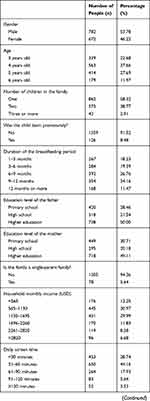 | 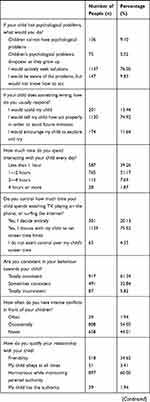 | 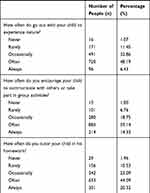 |
Table 1 Basic Situation Distribution |
Parents’ Educational Behaviours
Of parents, 76.05% actively sought solutions if their children had psychological problems, while 9.83% of parents would not know how to solve such problems even after becoming aware of them (Table 1). Of the parents, 13.44% scolded their child for committing a wrongdoing. Most children spent 1–2 hours with their parents daily (51.17%), but 39.26% of parents spent less than 1 hour daily with their children. Most parents (75.52%) controlled their children’s daily screen time by discussing a schedule with their children, and 61.34% of parents maintained totally consistent behaviours towards their children. Regarding parent–child relationships, most parents tried to get along peacefully with their children while maintaining authority (60.00%), and 55.99% of parents had had intense conflicts in front of their child. Most parents encouraged their children to communicate with other children or participate in group activities (59.14%); 48.19% of parents often took their children outside to experience nature, and 44.09% of parents often tutored their child when doing homework.
Analysis of Factors Affecting Pre-School Children’s Behaviours
Behavioural Problems and Demographic Factors of Pre-School Children
Amongst the demographic factors affecting the children’s behavioural problem scores, age, preterm birth, monthly household income and screen time differences were statistically significant (Table 2). Gender, number of children in the family, breastfeeding duration, parental educational background, and whether the family was a single-parent family were not significantly correlated with the children’s behavioural problem scores.
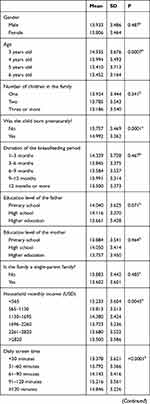 | 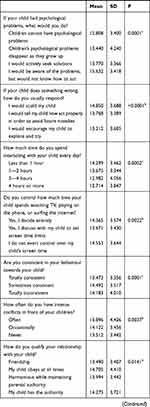 | 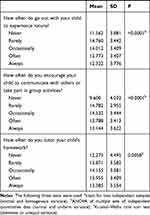 |
Table 2 Analysis of Factors Influencing Behavioural Problems in Pre-School Children |
Behavioural Problems in Pre-School Children Relative to Parental Educational Behaviour
All parental educational behaviour and attitude variables were significantly correlated with behavioural problem scores in pre-school children (Table 2). These variables included parents’ attitudes regarding the eventuality of their children developing psychological problems, parents’ responses to their child’s wrongdoings, daily parent–child interaction time, the control parents exerted over the child’s screen time, consistency of parental behaviours towards their child, frequency of intense conflicts in front of their child, the parent–child relationship, frequency of taking the child out to experience nature, frequency of encouraging the child to participate in group activities, and frequency of homework tutoring.
Analysis of Factors Affecting Children’s Behaviours
A generalized linear model was constructed based on the collected data. Behavioural problems were divided into dependent variables used in the linear regression analysis. Age was a significant factor affecting behavioural problem scores (Table 3). As age increased, the behavioural problem scores decreased (95% confidence interval [CI]: −0.702– −.298; p<0.0001). Preterm children scored higher than did non-preterm children (95% CI: 0.009–1.334; p=0.046). Children from families whose monthly income was in the $1130–$1695 USD range (95% CI: 0.582–1.901; p≤0.0001) and the $1696–$2260 USD range (95% CI: 0.152–1.630; p=0.036) scored higher than did children from families with monthly incomes below $565 USD. Regarding parents’ educational habits, compared with children who were scolded, children who were told how act properly to avoid future mistakes (95% CI: −1.366– −0.248; p=0.004) or were encouraged to explore and try (95% CI: −1.755– −0.275; p=0.007) obtained lower behavioural problem scores. Pre-schoolers whose daily interaction time with their parents was 1–2 hours (95% CI: −0.908– −0.111); p=0.012), 3–4 hours (95% CI: −2.502– −1.030; p<0.0001) and >4 hours (95% CI: −3.066– −0.139; p=0.031) obtained lower scores than did those whose interaction time with their parents was <1 hour per day. In addition, pre-school children who were encouraged by their parents to communicate with other children or participate in group activities rarely (95% CI: 1.229–5.278; p=0.001), occasionally (95% CI: 1.205–5.177; p=0.001), often (95% CI: 0.778–4.775; p=0.006) and always (95% CI: 0.387–4.523; p=0.019) scored higher than did those whose parents never encouraged them to participate in group activities.
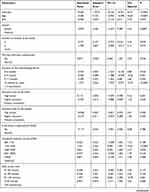 | 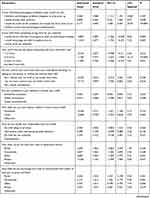 |  |
Table 3 Analysis of the Factors Affecting the Score of Behavioural Problems in Pre-School Children |
Discussion
Research on factors influencing behavioural problems in pre-school children is essential as the number of children with behavioural problems has increased in recent years.18 This study analysed data from children aged 3–6 years attending sixteen kindergartens in six different districts of Chongqing, China. The study sought to further explain the factors that influence behavioural problems amongst pre-school children by analysing the relationships between parental behaviours and children’s behavioural problems.
Results from this study showed that age significantly affected behavioural problem scores. As children aged, their behavioural problem scores decreased. Previous research revealed that the detection rate of behavioural problems in older children is higher than that for younger children. Studies have indicated that as children age, they develop intellectually. They interact with their environment and family in more complex ways and encounter increasing problems.19,20 Other studies concluded that because of the lack of maturity and self-control in younger children, the detection rate of behavioural problems in children <5 years old is higher than that in children >5 years old.21,22 At present, no consensus exists amongst experts regarding the development of behavioural problems and age; thus, further research is required. The present study showed that preterm birth increased the risk of behavioural problems. Other studies have indicated other factors related to preterm birth: (1) mothers of preterm infants may have mental illness during pregnancy (depression, anxiety and other disorders);23,24 (2) preterm infants are prone to neurodevelopmental disorders that affect their growth and development;25–27 and (3) preterm birth increases the risks of cerebral palsy and cognitive, visual and auditory disorders.28–30
This study also showed that children with parents whose monthly household income was $1130–2260 USD had higher psychological and behavioural problem scores. Many previous studies have focused on psychological and behavioural problems among children in low-income and high-income families.31,32 These studies showed that children in low-income families had more implicit and explicit problems as well as weak social abilities.33 Related interventional studies also revealed that helping poor families increase their income significantly improved the psychological problems in these children’s families.34,35
This study yielded diametrically different results when comparing the higher-income ($1130–$2260 USD) and lower-income (<$565 USD) groups. Professor Garmezy indicated that the family’s emotional environment, strong cohesion, and fewer conflicts between parents reduce the development of children’s psychological problems in low-income families.36 Further research is needed to better understand the links between the emotional environments of children in low-income families and the development of behavioural problems.
This study found that the duration of daily parent–child interactions affected the behavioural problem scores. Of parents, 39.26% spent less than 1 hour a day interacting with their child. This may be related to the lack of social support.37 Parents’ neglect of their children affects the children’s mental health38 and facilitates the development of psychological behavioural problems. Furthermore, parents’ scolding of their children increased the behavioural problem scores in pre-schoolers. Of the parents, 13.44% scolded their children when they did something wrong. While praising and encouraging children to develop improvement goals benefits the children’s mental health,39 excessive scolding negatively affects children’s mental health.
Evidence shows that parental behaviours can have positive or negative effects on the development of children’s behavioural problems.14–16 Therefore, the best way to prevent behavioural problems in pre-schoolers is to change parental habits. Criticizing and blaming children often only heightens conflicts. Parents should better understand child psychology and their own child’s mental state to reduce the occurrence of children’s behavioural problems.
The age of the child, preterm birth, monthly household income, duration of daily interaction between parents and their children, and parental response to children’s wrongdoings all affect the behavioural problems of pre-school children in Chongqing. Analysis of the maximum likelihood estimation revealed significant correlations between parents’ and children’s educational habits and behavioural problems. Further research with more validated measures that incorporate varied measurement techniques is needed to better understand such connections. When establishing intervention plans for children’s behavioural problems, mental health workers must fully consider the factors that affect children’s psychological and behavioural problems.
This study had some limitations. First, the participants were parents of pre-school children, but the questionnaire did not specify whether the “participants” were “caregivers”; hence, some data might have been biased. Second, parents’ self-reports of these variables are biased, especially related to social-expectation biases. Finally, according to the economic and regional characteristics of Chongqing City, China, the sample was representative, but because the research used a self-designed questionnaire, it may be applicable only to areas with the same economic development level as that of Chongqing City. These issues should be addressed in the future research.
Conclusion
The psychological and behavioural problems of pre-school children are closely related to factors such as age, monthly household income, preterm birth, daily interaction time between parents and their children, parental attitudes toward children’s wrongdoings and psychological problems. To reduce and prevent psychological and behavioural problems, intervention plans should thus focus on the early stages of children’s development, preterm children, those who have less than 1 hour of daily interaction with their parents, and those who are often scolded.
Disclosure
The authors report no conflicts of interest in this work.
References
1. Eikemo TA, Bambra C, Huijts T, et al. The first pan-European sociological health inequalities survey of the general population: the European social survey rotating module on the social determinants of health. Eur Sociol Rev. 2016;33(1):137–153. doi:10.1093/esr/jcw019
2. Loeber R, Farrington DP, Stouthamer-Loeber M, et al. Antisocial behavior and mental health problems: explanatory factors in childhood and adolescence. Psy Ser. 1999;50(12):1642. doi:10.1176/ps.50.12.1642
3. Polanczyk GV, Salum GA, Sugaya LS, et al. Annual research review: a meta-analy-sis of the worldwide prevalence of mental disorders in children and adolescents. J Child Psychol Psychiatry. 2015;56(3):345–365. doi:10.1111/jcpp.12381
4. Bibou-Nakou I, Kiosseoglou G, Stogiannidou AA. Elementary teachers’ perceptions regarding school behavior problems: implications for school psychological services. Psychol Schools. 2000;37(2):123–134. doi:10.1002/(SICI)1520-6807(200003)37:23.0.CO;2-1
5. Chronis AM, Lahey BB, Pelham WE, et al. Psychopathology and substance abuse in parents of young children with attention-deficit/hyperactivity disorder. J Am Acad Child Psy. 2003;42(12):1424–1432. doi:10.1097/00004583-200312000-00009
6. Jones AS. Maternal alcohol abuse/dependence, children’s behavior problems, and home environment: estimates from the national longitudinal survey of youth using propensity score matching. J Stud Alcohol Drugs. 2007;68(2):266–275. doi:10.15288/jsad.2007.68.26
7. Baker JK, Seltzer MM, Greenberg JS. Longitudinal effects of adaptability on behavior problems and maternal depression in families of adolescents with autism. J Fam Psychol. 2011;25(4):601–609. doi:10.1037/a0024409
8. Harvey T, Davoodi T, Blake PR. Young children will lie to prevent a moral transgression. J Exp Child Psychol. 2017;165:51–65. doi:10.1016/j.jecp.2017.06.004
9. Lovering K, Frampton I, Crowe B, et al. Community-based early intervention for children with behavioural, emotional and social problems: evaluation of the scallywags scheme. Emot Behav Diff. 2007;11(2):83–104. doi:10.1080/13632750600619257
10. Gump BB, Dykas MJ, Mackenzie JA, et al. Background lead and mercury exposures: psychological and behavioral problems in children. Environ Res. 2017;158:576–582. doi:10.1016/j.envres.2017.06.033
11. Viana MC, Gruber MJ, Shahly V, et al. Family burden related to mental and physical disorders in the world: results from the WHO World Mental Health (WMH) surveys. Rev Bras Psiquiatr. 2013;35(2):115–125. doi:10.1590/1516-4446-2012-0919
12. Fatori D, Bordin IA, Curto BM, et al. Influence of psychosocial risk factors on the trajectory of mental health problems from childhood to adolescence: a longitudinal study. BMC Psychiat. 2013;13(1):31. doi:10.1186/1471-244X-13-31
13. Soenens B, Deci EL, Vansteenkiste M. How parents contribute to children’s psychological health: the critical role of psychological need support. Springer Netherlands. 2017;2017:171–187. doi:10.1007/978-94-024-1042-6_13
14. Sherlock JM, Zietsch BP. Longitudinal relationships between parents’ and children’s behavior need not implicate the influence of parental behavior and may reflect genetics: comment on Waldinger and Schulz (2016). Psychol Sci. 2018;29:154–157. doi:10.1177/0956797617717041
15. Stephen N, Yasmin IC, Steven G, et al. The impact of prenatal parental locus of control on children’s psychological outcomes in infancy and early childhood: a prospective 5 year study. Front Psychol. 2017;8(2):155–166. doi:10.3389/fpsyg.2017.00546
16. Kieling C, Baker-Henningham H, Belfer M, et al. Child and adolescent mental health worldwide: evidence for action. Lancet. 2011;378(9801):1515–1525. doi:10.1016/S0140-6736(11)60827-1
17. Hongmei H, Chenlu Y, et al. Parental influence in forming preschool children’s eating behavior: across-sectional survey in Chongqing, China. 2019;7(140). doi:10.3390/healthcare7040140.
18. Broidy LM, Nagin DS, Tremblay RE, et al. Developmental trajectories of childhood disruptive behaviors and adolescent delinquency: a six-site, cross-national study. Dev Psychol. 2003;39(2):222–245. doi:10.1037/0012-1649.39.2.222
19. Luk SL, Leung PW, Bacon-Shone J, et al. The structure and prevalence of behavioral problems in Hong Kong preschool children. J Abnorm Child Psychol. 1991;19(2):219–232. doi:10.1007/BF00909979
20. Chen J, Yang D, Li P. The investigation report of psychological behavior of children aged 3-6 years of Yingquan District, Fuyang Anhui. Chinese J Women Child Health. 2016;7(4):59–61.
21. Qu HM, Li Q, Liu J. A study on psychological and behavioral problems and health education of preschool children. Chinese J Child Health Care. 2009;17(2):165–167.
22. Qu H, Lv L, Li Q, et al. Behavior problems and the influencing factors of school aged children in Nanjing. Chinese J School Health. 2008;29(9):810–812.
23. Van den Bergh BR, Marcoen A. High antenatal maternal anxiety is related to ADHD symptoms, externalizing problems, and anxiety in 8- and 9-year-olds. Child Dev. 2004;75(4):1085–1097. doi:10.2307/3696528
24. Van den Bergh BR, Mennes M, Oosterlaan J, et al. High antenatal maternal anxiety is related to impulsivity during performance on cognitive tasks in 14- and 15-year-olds. Neurosci Biobehavr. 2005;29(2):259–269. doi:10.1016/j.neubiorev.2004.10.010
25. Potijk MR, de Winter AF, Bos AF, et al. Higher rates of behavioural and emotional problems at preschool age in children born moderately preterm. Arch Dis Child. 2012;97(2):112–117. doi:10.1136/adc.2011.300131
26. Bastek JA, Sammel MD, Paré E, et al. Adverse neonatal outcomes: examining the risks between preterm, late preterm, and term infants. Am J Obstet Gynecol. 2008;199(4):367. doi:10.1016/j.ajog.2008.08.002
27. Aamoudse-Moens CSH, Weisglas-Kuperus N, van Goudoever JB. Meta-analysis of neurobehavioral outcomes in very preterm and/or very low birth weight children. Pediatrics. 2009;124(2):717–728. doi:10.1542/peds.2008-2816
28. Limperopoulos C, Bassan H, Sullivan NR, et al. Positive screening for autism in expreterm infants: prevalence and risk factors. Pediatrics. 2008;121(4):758–765. doi:10.1542/peds.2007-2158
29. Smhovd MJ, Hansen BM, Brok J, et al. Anxiety in adolescents born preterm or with very low birthweight: a meta-analysis of case–control studies. Dev Med Child Neurol. 2012;54(11):988–994. doi:10.1111/j.1469-8749.2012.04407.x
30. Johnson S, Marlow N. Preterm birth and childhood psychiatric disorders. Pediatr Res. 2011;69(5Pt2):11R–8R. doi:10.1203/PDR.0b013e318212faa0
31. Bantel S, Schlaud M, Walter U, et al. Factors associated with behavioral problems in preschool age: secondary data analysis of routine examination at school enrolment 2010/2014 in the hannover region. Gesundheitswesen. 2019;81(11):881–887. doi:10.1055/a-0594-2373
32. Cole MB, Qin Q, Sheldrick RC, et al. The effects of integrating behavioral health into primary care for low income children. Health Serv Res. 2019;54(6):1203–1213. doi:10.1111/1475-6773.13230
33. Mistry RS, Biesanz JC, Taylor LC, et al. Family income and its relation to preschool children’s adjustment for families in the NICHD study of early child care. Dev Psychol. 2004;40(5):727–745. doi:10.1037/0012-1649.40.5.727
34. Gennetian LA, Miller C. Children and welfare reform: a view from an experimental welfare program in minnesota. Child Dev. 2002;73(2):601–620. doi:10.1111/1467-8624.00426
35. Huston AC, Duncan GJ, Mcloyd VC, et al. Impacts on children of a policy to promote employment and reduce poverty for low-income parents: new hope after 5 years. Dev Psychol. 2005;41(6):902–918. doi:10.1037/0012-1649.41.6.902
36. Garmezy N. Children in poverty: resilience despite risk. Psychiatry. 1993;56(1):127–136. doi:10.1080/00332747.1993.11024627
37. Winston R, Chicot R. The importance of early bonding on the long-term mental health and resilience of children. London J Prim Care. 2016;8(1):12–14. doi:0.1080/17571472.2015.1133012
38. Treyvaud K, Anderson VA, Lee KJ, et al. Parental mental health and early social-emotional development of children born very preterm. J Pediatr Psychol. 2010;35(7):768–777. doi:10.1093/jpepsy/jsp109
39. Gunderson EA, Donnellan MB, Robins RW, et al. The specificity of parenting effects: differential relations of parent praise and criticism to children’s theories of intelligence and learning goals. J Exp Child Psychol. 2018;173:116–135. doi:10.1016/j.jecp.2018.03.015
 © 2020 The Author(s). This work is published and licensed by Dove Medical Press Limited. The full terms of this license are available at https://www.dovepress.com/terms.php and incorporate the Creative Commons Attribution - Non Commercial (unported, v3.0) License.
By accessing the work you hereby accept the Terms. Non-commercial uses of the work are permitted without any further permission from Dove Medical Press Limited, provided the work is properly attributed. For permission for commercial use of this work, please see paragraphs 4.2 and 5 of our Terms.
© 2020 The Author(s). This work is published and licensed by Dove Medical Press Limited. The full terms of this license are available at https://www.dovepress.com/terms.php and incorporate the Creative Commons Attribution - Non Commercial (unported, v3.0) License.
By accessing the work you hereby accept the Terms. Non-commercial uses of the work are permitted without any further permission from Dove Medical Press Limited, provided the work is properly attributed. For permission for commercial use of this work, please see paragraphs 4.2 and 5 of our Terms.
